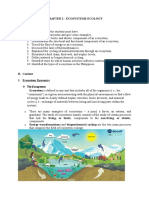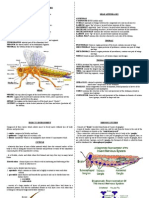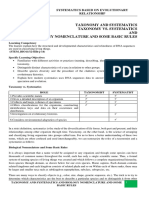Behavioral Ecology Questions
Behavioral Ecology Questions
Uploaded by
zylin555Copyright:
Available Formats
Behavioral Ecology Questions
Behavioral Ecology Questions
Uploaded by
zylin555Original Description:
Copyright
Available Formats
Share this document
Did you find this document useful?
Is this content inappropriate?
Copyright:
Available Formats
Behavioral Ecology Questions
Behavioral Ecology Questions
Uploaded by
zylin555Copyright:
Available Formats
Behavioral Ecology Questions you may want to use Campbell Textbook to answer a
few of these
1. What is the difference between proximate and ultimate causes? Develop a
question that inquires about a proximate cause of a specific behavior and a
second question that inquires about an ultimate cause of a specific behavior.
2. What is the difference between a kinesis and a taxis? Please give an example (not
used in the text) for each.
3. Imagine that you were doing a lab with in which you put pill bugs in choice
chambers. If one chamber has a dry disk of filter paper and the other a damp
disk of filter paper, hypothesize where the pillbugs will likely be after 15 minutes.
Explain.
4. Signals can cause changes in behaviors and are the basis for animal
communication. Signals may be pheromones, visual or auditory. Speculate and
explain your reasoning on which signal would be most effect in the following
animals:
a. A male robin defending his territory from other males
b. A male fruit fly courting a female
c. A female moth looking for a mate in the 100 acre woods
d. Your pet dog in claiming your house as his own when a strange dog shows
up
5. What are the differences between classical conditioning and operant
conditioning? Please give an example (not used in the text) for each.
6. Your roommate snores, but after 3-4 nights you no longer notice. What behavior
does your failure to respond to this stimulus represent? Explain.
7. What has human twin studies suggested about the role of environment (nurture)
and genetics (nature) in human behavior? Give some examples to illustrate your
arguments.
8. Discuss how altruism can increase the evolutionary fitness of an individual.
9. Male competition for breeding access to females often uses ritualized behaviors.
What is the adaptive advantage of not fighting to the death in these cases?
Explain.
10. What is the role of mutation in evolution of fixed action patterns?
11. Write then answer a question from this chapter than you think was important
enough to be on an AP exam but was not tested by my previous questions.
You might also like
- Behavioral EcologyDocument16 pagesBehavioral Ecologyrvshn100% (1)
- Behavioral: Photo From Wikimedia CommonsDocument27 pagesBehavioral: Photo From Wikimedia CommonsLance CarandangNo ratings yet
- Midterm Exam General Ecology Ws 2013-14-13900557Document2 pagesMidterm Exam General Ecology Ws 2013-14-13900557premoh0% (1)
- Quantitative EcologyDocument123 pagesQuantitative EcologyKrishnan JeevanNo ratings yet
- Biodiversity and Its ConservationDocument48 pagesBiodiversity and Its Conservationvhon bryan buhat silvanoNo ratings yet
- Lec 3, 4 Ecology, EcosystemDocument16 pagesLec 3, 4 Ecology, Ecosysteminortoganic inortoganicNo ratings yet
- Mod 6 Evolution and ClassificationDocument7 pagesMod 6 Evolution and ClassificationrasingtanyaroseNo ratings yet
- Lecture 1 - Zoology - Evolutionary Perspective-2Document34 pagesLecture 1 - Zoology - Evolutionary Perspective-2AbegailNo ratings yet
- Biogeochemical CycleDocument10 pagesBiogeochemical CycleKian Tecson100% (1)
- Forest and Wildlife NB Q&AsDocument4 pagesForest and Wildlife NB Q&AsHimanshu TalwarNo ratings yet
- Biology and EcologyDocument5 pagesBiology and EcologykarennNo ratings yet
- GENERAL BIOLOGY 4th Quarter - ACTIVITY #1-5Document7 pagesGENERAL BIOLOGY 4th Quarter - ACTIVITY #1-5Kimberly AyusoNo ratings yet
- SL 102 Soil Biological Properties Lect 1&2Document65 pagesSL 102 Soil Biological Properties Lect 1&2Neville TNo ratings yet
- 2007 Ecology RochesterDocument9 pages2007 Ecology RochestermmsalNo ratings yet
- Community Ecology PowerpointDocument31 pagesCommunity Ecology PowerpointNGNo ratings yet
- Analyzing Different Types of Antennae in InsectsDocument25 pagesAnalyzing Different Types of Antennae in InsectsVahin Rajput100% (1)
- Unit 7 PDFDocument22 pagesUnit 7 PDFAdesh RaoNo ratings yet
- Environmental Science Your World Your Turn Chapter 6 NotesDocument26 pagesEnvironmental Science Your World Your Turn Chapter 6 NotesTaylorRayKaneNo ratings yet
- Whatisa Cladogram KEYDocument6 pagesWhatisa Cladogram KEYKate WebbNo ratings yet
- Unit 3 Behavioral EcologyDocument27 pagesUnit 3 Behavioral EcologyVenus AnteroNo ratings yet
- 2 EcosystemsDocument68 pages2 EcosystemsSanjana SNo ratings yet
- Agricultural EntomologyDocument85 pagesAgricultural EntomologyGirma MogosNo ratings yet
- BiodiversityDocument66 pagesBiodiversityRahul ChaudharyNo ratings yet
- 02-EnVI SCI - Ecological Principles and ConceptsDocument26 pages02-EnVI SCI - Ecological Principles and ConceptsJochebed ReyesNo ratings yet
- General Insect Physiology 3344Document14 pagesGeneral Insect Physiology 3344Shawn BlueNo ratings yet
- Insects' Sensory & BehaviorDocument73 pagesInsects' Sensory & BehaviorUmmi Nur AfinniNo ratings yet
- Fish Taxonomy and Systematics: Taxonomic SystemsDocument43 pagesFish Taxonomy and Systematics: Taxonomic Systemssarfaraz.laghari03No ratings yet
- Chapter 2 - Ecosystems Ecology A. Learning ObjectivesDocument23 pagesChapter 2 - Ecosystems Ecology A. Learning ObjectivesMarel Bonna E. QuipanesNo ratings yet
- Entomology Lab HandoutsDocument13 pagesEntomology Lab Handoutshumanupgrade100% (1)
- Ecological PyramidsDocument19 pagesEcological Pyramidsnandhinidish100% (1)
- Taxonomic Nomenclature2Document18 pagesTaxonomic Nomenclature2zendamariesabinayNo ratings yet
- BIOL 112 S 2011 Practice Midterm Exam CH 4 110517.1Document18 pagesBIOL 112 S 2011 Practice Midterm Exam CH 4 110517.1Joshua Nelson100% (1)
- Old World Fruit BatsDocument263 pagesOld World Fruit BatsAnonymous HXLczq3No ratings yet
- g7 EcosystemDocument13 pagesg7 EcosystemGenie SorianoNo ratings yet
- BSAB-Agricultural Extension and Communication..Document14 pagesBSAB-Agricultural Extension and Communication..Efren MamaranNo ratings yet
- Evolution, Species, Interactions and Biological CommunitiesDocument21 pagesEvolution, Species, Interactions and Biological CommunitiesLourdes Alexandra Guerrero OcanaNo ratings yet
- Community EcologyDocument60 pagesCommunity EcologyBom ChanNo ratings yet
- Alemayehu Lemessa - ThesisDocument81 pagesAlemayehu Lemessa - ThesisgezahegnNo ratings yet
- Marine EcosystemDocument21 pagesMarine EcosystemPIYAM DAVENo ratings yet
- Terrestrial Ecology Lecture 1Document67 pagesTerrestrial Ecology Lecture 1Louella ArtatesNo ratings yet
- Unit Bryophyta (Paper Code 502)Document47 pagesUnit Bryophyta (Paper Code 502)Abhishek Singh Chandel0% (1)
- Insects: 1. OdonataDocument17 pagesInsects: 1. OdonataHemant JoshiNo ratings yet
- Chapter 23 Plant PhysiologyDocument55 pagesChapter 23 Plant PhysiologyReena Clarisse AviñanteNo ratings yet
- Lab Manual Animal Systematic II 2017 - Activity IDocument2 pagesLab Manual Animal Systematic II 2017 - Activity IVio Indah BudiartiNo ratings yet
- B.Sc-Agriculture 1 Semester-SyllabusDocument16 pagesB.Sc-Agriculture 1 Semester-Syllabusabhay kumarNo ratings yet
- Insect Ecology Integrated Pest Management Dec. 3 2023Document16 pagesInsect Ecology Integrated Pest Management Dec. 3 2023bedalea07No ratings yet
- Population Ecology WorksheetDocument7 pagesPopulation Ecology WorksheetrkvNo ratings yet
- BiodiversityDocument32 pagesBiodiversityPrateek Gandhi100% (1)
- Science of EcologyDocument2 pagesScience of Ecologyhomamunfat100% (1)
- A Course Outline Ecology 2014 2015Document11 pagesA Course Outline Ecology 2014 2015Jamila BestNo ratings yet
- What Shapes An Ecosystem Guided NotesDocument7 pagesWhat Shapes An Ecosystem Guided Notesapi-263275919100% (1)
- Biological InteractionDocument4 pagesBiological InteractionMaynard PascualNo ratings yet
- Taxonomy and Systematic and Biology Nomenclature and Some Basic Rules PDFDocument3 pagesTaxonomy and Systematic and Biology Nomenclature and Some Basic Rules PDFjer montillaNo ratings yet
- Final Role of Insect in AgricultureDocument36 pagesFinal Role of Insect in AgricultureKiky KimuraNo ratings yet
- Taxonomy and Classification....Document8 pagesTaxonomy and Classification....Andrew MarariaNo ratings yet
- 28 Orders of InsectsDocument5 pages28 Orders of InsectsJoelben NaresNo ratings yet
- Species InteractionDocument19 pagesSpecies InteractionStyrich Nyl AbayonNo ratings yet
- Scope of EcologyDocument11 pagesScope of Ecologybrowneyes_luke6052100% (3)



























































